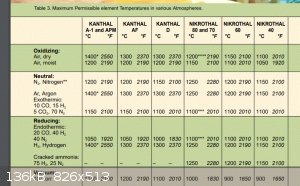coppercone
Hazard to Others
  
Posts: 133
Registered: 5-5-2018
Member Is Offline
|
|
kanthal wire in a vacuum?
So I heard the technochemistry forum is kind of dead, but a specific question I need for my general thread:
I am looking to build a kiln, some design details have been worked out, and I was looking to use kanthal wire, coiled in grooves to heat the thing. I
believe I am capable of making a vacuum tight enclosure, but my question is:
Does kanthal wire sublime significantly in a vacuum? The A1 kind. I was wondering if for chemistry applications If you need to enclose the wire in
quartz tubes, so the sublimation vapors are contained (but I imagine this could lead to short circuits).
|
|
|
VSEPR_VOID
National Hazard
   
Posts: 719
Registered: 1-9-2017
Member Is Offline
Mood: Fullerenes
|
|
That would all depend upon how hot you plan to keep the kiln and at what pressure. Kanthal has a mp of 1500 C so you should be fine I would think. It
also forms a protective layer of oxides which should help as well.
Also I do not know why we have a technochemistry forum. Its sort of redundant.
[Edited on 15-5-2018 by VSEPR_VOID]
Within cells interlinked
Within cells interlinked
Within cells interlinked
|
|
|
zed
International Hazard
    
Posts: 2284
Registered: 6-9-2008
Location: Great State of Jefferson, City of Portland
Member Is Offline
Mood: Semi-repentant Sith Lord
|
|
Now, here I have some experience. And, it's touchy area.
Vacuum is a wonderful insulator.
Transmitting heat to your project might be greatly impeded under vacuum conditions.
Your heating elements, however will be beautifully insulated; they will be unable to shed heat.
Accordingly, they may vaporize. Did I say vaporize? I meant explode. Poof.
At least, I have observed this phenomena with other metals.
Hook up two 12 volt auto batteries in parallel, attach 'em to an upright set of electrodes, controlled by throw switch. Bridge the electrodes with
a suitable gauge copper wire/rod, so that when you flip the switch, the rod achieves a smoldering heat.
Repeat the experiment. Only now, utilize a bell housing, to produce a hard vacuum, over your area of interest. This time, when you flip the switch,
there will be a brilliant flash of light as your copper conductor explodes/vaporizes.
Your Kanthal wire, under some conditions, could be blown to smithereens.
Perhaps induction heating a possiblity?
[Edited on 15-5-2018 by zed]
[Edited on 15-5-2018 by zed]
|
|
|
coppercone
Hazard to Others
  
Posts: 133
Registered: 5-5-2018
Member Is Offline
|
|
The handbook has a correction factor for maximum temperature of the furnace under vacuum but i did not see one for watt loading which is basically
heat dissipation per area of heating element. Time to take another look.
|
|
|
yobbo II
National Hazard
   
Posts: 766
Registered: 28-3-2016
Member Is Offline
Mood: No Mood
|
|
Edit: Just realized you already have this info.
Handbook from here attached
http://www.hi-tempproducts.com/pdf/the-kanthal-furnace-mini-...
Attachment: the-kanthal-furnace-mini-handbook.pdf (1.4MB)
This file has been downloaded 1360 times 
[Edited on 15-5-2018 by yobbo II]
|
|
|